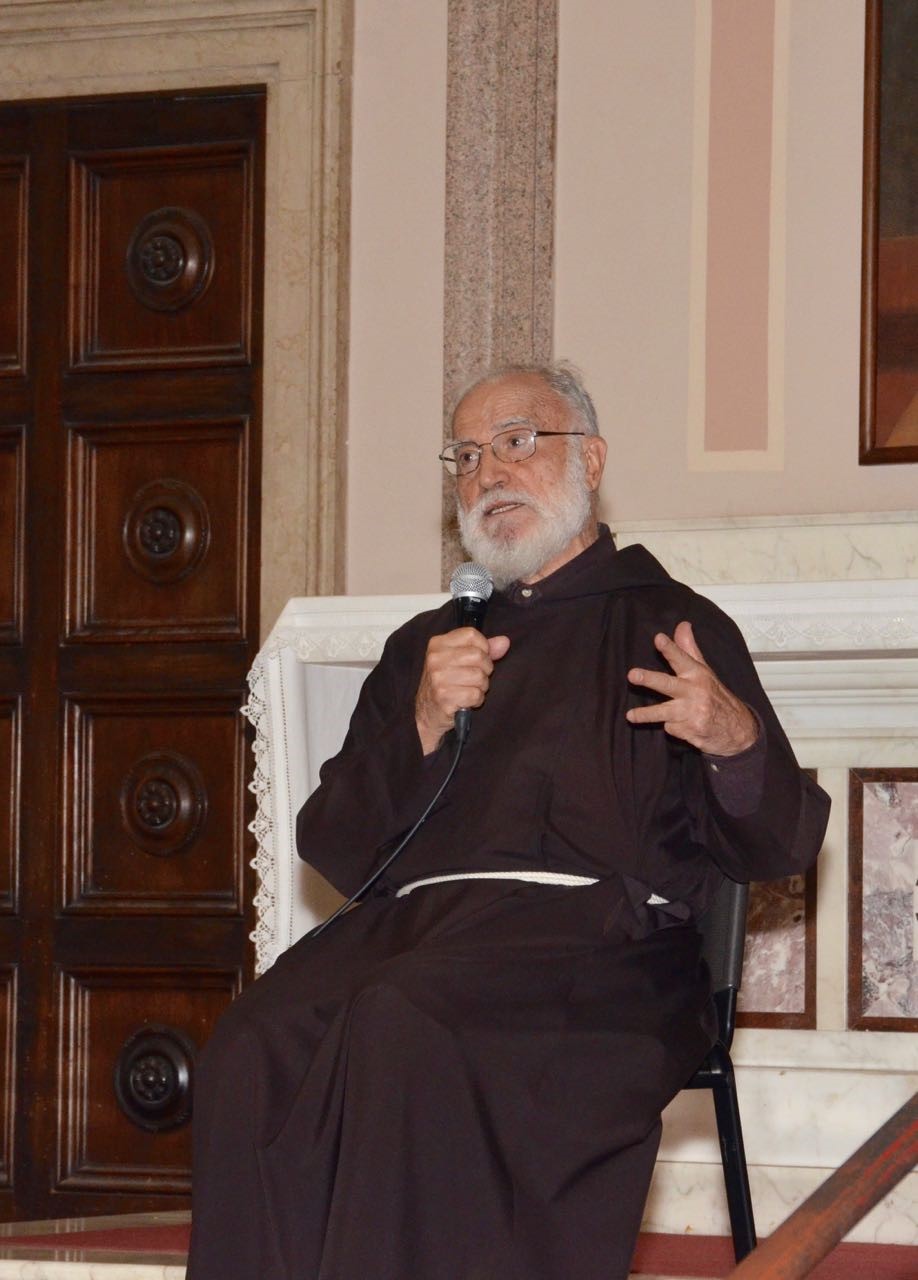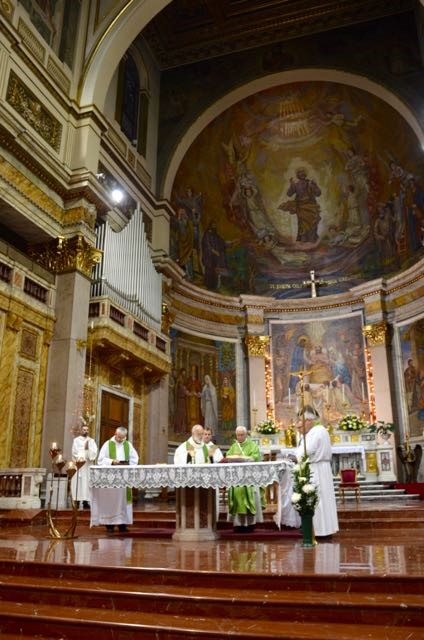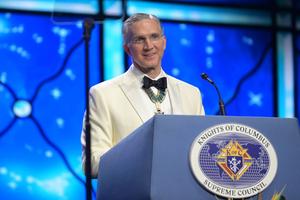Mobilizing Men: Rome Hosts First International Catholic Men’s Conference
The Nov. 3-7 event featured the papal preacher, Capuchin Father Raniero Cantalamessa, and aimed at fortifying men for the key role they play in their families and in the life of the Church.

ROME — “There is a serious Catholic ‘man-crisis,’” says Bill Moyer, founder of a men’s fellowship group in Texas.
“Millions have left the faith or are lukewarm in their faith. Men are failing to properly catechize and lead their families to Christ. Men are failing as spiritual leaders in their families. This has caused a great disintegration of the family.”
As founding member of the Central Texas Fellowship of Catholic Men and the National Catholic Men’s Leadership Alliance, Moyer believes “there is much work to do” but is encouraged by signs of a “great spirit of cooperation” among Catholic men’s groups all over the world to “become spiritual heads of their families.”
One example of this was the first International Catholic Men’s Meeting, held in Rome Nov. 3-7, at which Moyer was one of the participants.
Organized by the Men of St. Joseph, a Polish group, and under the patronage of the European Bishops’ Council, the event focused on the universal call to holiness, featured the papal preacher, Capuchin Father Raniero Cantalamessa, and concluded with an open letter to Pope Francis aimed at helping clergy, laity, educators and others to understand the crisis facing men and inspire them to help “restore a sound Christian manliness.”


Phillip Chavez, founder and president of The Men's Academy, said the conference reaffirmed his belief that the “most common problem” men face is “grasping their natural role as a leader of their families,” which he said is “obscured in today’s culture.”
Men need to embrace this role “sacrificially” without being “apologetic,” he said, adding that he believes this can be achieved if they are guided “in their relationships with the Trinity,” rather than focusing too much on how God is working in their lives.
Andrzej Lewek, leader of the Men of St. Joseph International and one of the organizers of the Rome conference, said if men embrace their role “as leader, protector, provider,” then the “quality of life and relationships in our families will increase” and ultimately “push other men to follow our example and become friends of Christ.”
“We need to follow him, as He is root of all graces and source of real life,” he said.
Lewek noted that Catholic men’s groups have grown significantly in Poland and other countries over the past decade.
The Rome Meeting
The Rome event, entitled “Men’s Siege of the Eternal City” (chosen to reflect that men must be equipped spiritually for battle and fight side by side if they are to win the good fight) was aimed at establishing an international venue to “exchange our experiences” and to encourage men to be witnesses to those in other countries “where the men are still sleeping,” Lewek explained.
“God is doing new things,” he said, which is “giving us great hope on the restoration of Christianity in the Western world.”
The four-day Rome meeting consisted of four talks by Father Cantalamessa, daily Mass, Eucharistic adoration and morning prayer.
Moyer said he appreciated the “great sharing of what we are all doing to evangelize men” during the group meetings. Several priests also took part, as did Archbishop Zbigņev Stankevičs of Riga, Latvia. A group of participants also went out one evening to feed the homeless on the streets of Rome.
Chavez, a specialist on men’s ministry for nearly two decades, stressed the importance of such meetings at a time when “men are confused about their identity and mission in today’s world.” He said many men “sense there is something wrong, but do not know how to explain the problems — or, rather, they do not really understand the deeper issues.”
“While most believe it is a matter of simply growing in the spiritual life, there are deep human needs men have that are not being fulfilled,” he said. “On the natural level, men fail to understand fully and embrace properly their roles as leaders, protectors and providers. They are not rising up completely to the role bestowed upon them.”
‘Dynamic Faith’ Required
On the supernatural level, Chavez said, most men are unable to live “a dynamic faith that brings the peace and promises of Jesus Christ.” Many, he said, “fail to pray heart to heart with their Heavenly Father; they are not led to intimacy. And they have difficulties conforming their lives to the journey of the Divine Son.”
This failure to move “through him, with him and in him,” he said, means men “trust too much in their own strengths and continue to navigate faith in light of ‘what they do’ instead of ‘who they are.’”
Lewek said that, humanly speaking, “we have already lost this war,” but, with God, men are able to “step into the battle on the right side” by letting the Lord “equip us and strengthen us.” And this can best be done by joining a Catholic men’s group or creating one if it does not yet exist.
Such men’s groups, Lewek said, “are the hope for the future.”
“Men somehow learn best when they are together — they need opportunities to talk with each other about these core problems,” said Chavez, adding that the Rome conference showed that men’s journeys are mostly the same but can have different approaches.
Moyer said he is “very optimistic” that men can recover their identity and God-given role through such cooperation, but there is “much work to do.” He also noted “much resistance to this in many areas” in the form of political correctness that “causes men and many priests and bishops to fail to support the efforts of the Godly men who are fighting the battle.”
He also believes that the loss of male identity and the emasculation of culture in the West “is definitely a contributing factor” to the sex-abuse crisis. “We have an entire generation of men who were raised in families without a strong male influence. Men have been absent from their families and absent from the Church.”
The views were echoed by Chavez, who said sexual abuse often is due to poor parental formation and a “poor vision of manliness.” Males rarely experience “healthy psycho-sexual teaching and training” from their parents or educators, and this shortcoming can lead to same-sex attraction, he said.
“Clerical sex abuse is able to occur, given a culture of emasculation in the seminaries and in priestly life,” Chavez added. “While most priests are not abusers, the emasculated culture enables these crimes to happen.” And what is crucial to note, he said, is that “many are failing to stand up to protect” the most vulnerable.
“Without the role of protector fostered in the minds and hearts of clerics, they will inevitably abandon the innocent and, at worse, defend the guilty,” he said.
The Open Letter
In their open letter, the participants laid out all the main challenges men face in today’s societies, suggested ways of helping them, and called on the Holy See to offer greater guidance and preparation on both married life and the “nature of Christian manliness, including clear explanations of the duties of husbands and fathers.”
They also implored the Congregation for Catholic Education and the Dicastery for Laity, Family and Life to “give substantive attention to the subject of manliness and the roles of men.”
Observing that great attention has been given to creating a women’s section in the dicastery for the laity, they suggested with “deepest filial respect and humble disposition” that the dicastery also establish “an equivalent for men.”
Edward Pentin is the Register’s Rome correspondent.
- Keywords:
- catholic men
- edward pentin
- men's conferences


















